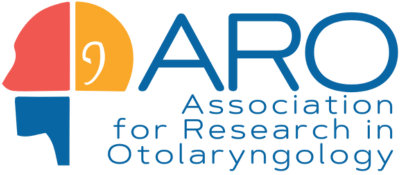
ARO MEMBER SPOTLIGHT
Exciting News! The Member Spotlight Program is Getting a Makeover!
The ARO Membership Committee is revamping the Member Spotlight program to better highlight the incredible work of our members. While we're working on some exciting updates, we want to let you know that this initiative will be back soon, with more opportunities to showcase your contributions to the field! Stay tuned for more details and how you can get involved.
We can’t wait to celebrate you and your work!
SPOTLIGHT PROFILES
Eric LePage, Ph.D.
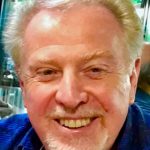
Self-employed, full time, Perth, Australia, library support from University of Western Australia
How long have you been an ARO member? Since 1982, the year after I came to Wash U in
St.Louis for my post-doc on an RO1 obtained by Kim and Molnar. In 1982 Hal Davis at CID invited me as co-author for his "cochlear amplifier" paper. Fatefully, I had already decided my explanation must be centered upon basilar membrane baseline shifts.
What do you enjoy most about being an ARO member? Access to the very latest thoughts on cochlear mechanisms and the challenges they present.
Where has your favorite MidWinter Meeting (MWM) been? St. Pete Beach, sometimes going to Crabby Bill's to eat fish and chips.
Share one memorable experience from a past ARO MWM. Watching Ake Flock receive his award after showing a video of outer hair cells dancing in response to music of The Beatles.
Tell us about your work, with a focus on research efforts. My two outputs in the last 12 months are:
1) Mechanics of Hearing Workshop, held at Helsingor, Denmark, July 2022.
LePage (2022): Digitization and Reanalysis of Fiber-optic Displacement Data: An Elephant in the
Chamber? (A talk with video showing rapid micrometer BM displacements in response to tone
bursts).
2) Prosper Meniere Society Meeting, Zell am Ziller, Austria, March 2023.
LePage (2023): Towards a holistic model for hydrodynamic pressure regulation in the mammalian cochlea -- clues from summating basilar membrane responses to sound plus micropuncture pressure experiments. Since 2007 I have been testing my hypothesis (MoH2011) that the endolymphatic duct, lined by tight-junctions, is a highly-controlled pressure vessel. There seems much scope for an aquaporin-based model to fulfill the failed objectives of the cochlear amplifier, basically functioning as a long-documented low-frequency bias effect (LePage, 1987, 2022). Only after suspecting Nature's nasty trick, I have succeeded in measuring hydrostatic pressures inside the cochlear chambers of Mongolian Gerbils. The pressures may be large (at least five times systolic pressure). The results fulfill my 1987 prediction and also have the potential explain clinical problems like perilymphatic fistulas and dehiscences. Many thanks to Paul Avan, Hero Wit and Pim van Dijk for early support.
Aside from research, what other activities do you participate in? I enjoy my four sons and their families, including three grandchildren. I am still active in music making and walk the large local reserve and swim 2km per week.
Adele Moatti, Ph.D.
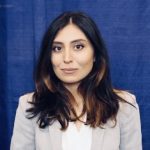 North Carolina State
North Carolina State
Universit University of North Carolina at Chapel Hill
How long have you been an ARO member? 5 months
What do you enjoy most about being an ARO member? The frequency of on-line seminars by experts.
Tell us about your work, with a focus on research efforts. My previous research was in the areas of advanced imaging and technology development to characterize the characteristics and development of porcine cochlea that reside deep in the bone by developing a bone-clearing method, working with a custom light-sheet microscope, and analyzing big datasets (Moatti et al. 2020; 2022). Using these techniques, I established the pig as a suitable animal model to study hearing loss. I have also developed a porcine ex-vivo platform to test drug delivery effectiveness to the inner ear (Moatti et al. under revision). To that end, I have isolated extracellular vesicles from the inner ear cells and proposed their application as drug carriers to improve the safe delivery to the inner ear (NIDCD K99-R00 award). In the future, my research will focus on: (i) Engineering techniques to improve biologics/therapeutics delivery. (ii) Advancement of smart therapeutics to respond to environmental stimuli. (iii) Translational applications, particularly in hearing loss, aging, and tissue engineering. (iv) Utilizing imaging systems and algorithms to image deeper into tissue and to characterize disease states and the bio-distribution of drugs and biologics in the entire organ.
Aside from research, what other activities do you participate in? I teach Yoga!
Deniz Başkent, Ph.D.
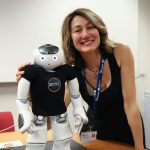 University of Groningen, University Medical Center Groningen, Dept. Otorhinolaryngology, dB SPL Lab, Groningen, The Netherlands
University of Groningen, University Medical Center Groningen, Dept. Otorhinolaryngology, dB SPL Lab, Groningen, The Netherlands
How long have you been an ARO member? Must be since 1999, when my PhD advisor Bob
Shannon let me go to my very first conference!
What do you enjoy most about being an ARO member? Seeing old colleagues and friends, and meeting new colleagues and friends, getting inspiration from exciting science discussions.
Where has your favorite MidWinter Meeting (MWM) been? St. Petersburg Beach, San Diego, Baltimore, and also New Orleans. Every organisation was great, and lucky for me I have best friends I can visit at each of these locations.
Share one memorable experience from a past ARO MWM. Several:
My first poster presentation. I had stumbled on a great study in my PhD Lab at House Ear Institute, and apparently I presented the poster for 8 hours non-stop talking.
The parties Bob Shannon organised, great opportunity to catch up with everyone.
Tell us about your work, with a focus on research efforts. My background is in Electrical and Biomedical Engineering but I work at the Medical Faculty of our university, in close collaboration with our clinical stuff as well as colleagues from the Linguistics and Psychology Faculties of our university. This is very fitting as I find it difficult to work on one area only, there is just so much to learn and find out. Also my heart lies in practical applications, the motivation always remains in if we can find something that can children and adults with hearing loss. As a result, we run a number of projects in parallel in our lab.
Currently, we are investigating how children with hearing devices perceive voices, voice emotions,
and also speech in noise. We want to identify potential difficulties and, if possible, also work with
device manufacturers to produce solutions. In adults, we are investigating voice perception, since
implanted adults report great difficulties here. We investigate how perception of voices may vary
with linguistic content, with device processing, but also with musicianship or other relevant
experience. We also continually investigate new ways of providing perceptual training, for example, using music training via learning to play piano or using humanoid robots.
Aside from research, what other activities do you participate in? Like being involved also outside research, have been in teaching and advisory committees, and currently also starting a new robotics program for healthcare. Outside university, singing, dancing, swimming, and coffee and friends are a must too.
Abigail Dragich
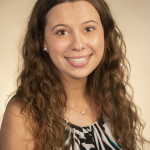
University of Kentucky, Department of Physiology, Frolenkov Lab, Lexington KY
How long have you been an ARO member? Since 2018
What do you enjoy most about being an ARO member? Networking and sharing ideas with fellow scientists.
Where has your favorite MidWinter Meeting (MWM) been? Baltomore!
Tell us about your work, with a focus on research efforts. My work focuses on
understanding the mechano-electrical transduction processes of auditory hair cells. Utilizingwhole-cell patch clamp recordings allows me to measure many characteristics of the transduction currents. In the Frolenkov lab, we use various strains of mice with mutations in auditory proteins that cause deafness in humans to explore how the mutations lead to deafness. Additionally, these strains allow us to figure out how certain proteins may function normally in the mammalian
auditory system
Aside from research, what other activities do you participate in? Painting, traveling, and hunting!
Srivatsun Sadagopan, Ph.D.
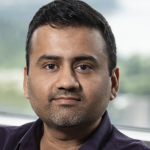 Department of Neurobiology, University of Pittsburgh Pittsburgh, Pennsylvania. PI of the Area41 lab
Department of Neurobiology, University of Pittsburgh Pittsburgh, Pennsylvania. PI of the Area41 lab
How long have you been an ARO member? 7 years as a PI, and before that, a couple of years as a graduate student
What do you enjoy most about being an ARO member? It's a great forum to interact with the auditory neuroscience community. The mid-winter meeting is fantastic.
Where has your favorite MidWinter Meeting (MWM) been? San Diego, CA! I attended my first US scientific conference in San Diego , so I have some extra fondness for that city.
Share one memorable experience from a past ARO MWM. The Award of Merit lecture by Dr. Alan Palmer in 2017. I had switched animal models to guinea pigs as a PI, in part inspired by Dr. Palmer's work. It was a treat to see him describe his studies in detail, and at a personal level, the talk gave me the confidence that I had made a good choice!
Tell us about your work, with a focus on research efforts. Our lab studies fundamental
cortical mechanisms underlying the processing of complex sounds, in particular, conspecific
vocalizations. We use computational, behavioral, and electrophysiological methods to address this
question in a guinea pig animal model. Going forward, we hope to use vocalization-driven behavior as a window into social cognition.
Aside from research, what other activities do you participate in? I am a spARO mentor. I have co-organized an ARO mini-symposium in the past, and hope to do so again soon!
Marlan Hansen, M.D.
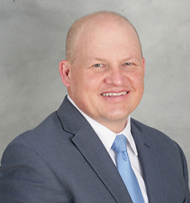 University of Iowa,
University of Iowa,
Departments of Otolaryngology-Head and Neck Surgery, Neurosurgery, and Molecular Physiologyand Biophysics, Iowa City, Iowa
How long have you been an ARO member? 26 years
What do you enjoy most about being an ARO member?
1- Interaction with colleagues and collaborators.
2- The energy and creativity of new members particularly students and post-doctoral fellows.
Where has your favorite MidWinter Meeting (MWM) been? I always love meetings in SanDiego. Consistently great weather, environment, and food.
Share one memorable experience from a past ARO MWM. My first ARO MWM in St. Pete Beach remains the most memorable. The science was fascinating. The ARO members wereengaging and collegial. I was inspired and hooked.
Tell us about your work, with a focus on research efforts. My research involves multidisciplinary approaches to basic, translational, and clinical investigations broadly related to auditory neurobiology and vestibular schwannoma tumorigenesis. Our lab has a longstanding interest in the neurobiology of auditory neurons with a particular focus on understanding signaling pathways that govern neural survival, regeneration, and neurite guidance. We also use tissue and bioengineering approaches to improve the ability of cochlear implants to restore complex auditory perception. To this end, we collaborate with Dr. C Allan Guymon's research group to develop thin
film coatings for cochlear implant biomaterials that reduce biofouling, biofilm formation, and the fibrotic foreign body response. They also enable sustained, controlled delivery of pharmacotherapeutics. In clinical research, I collaborated with a large multidisciplinary team to evaluate factors that enhance outcomes with cochlear implantation including hearing preservation, robotics-assistance and intraoperative electrophysiological measures. I am a co-founder of
IotaMotion, Inc that is developing robotics and related technology to improve cochlear implant performance.
Aside from research, what other activities do you participate in? Clinical and surgical practice, family activities, cycling, basketball
Melissa Castillo Bustamante, M.D.
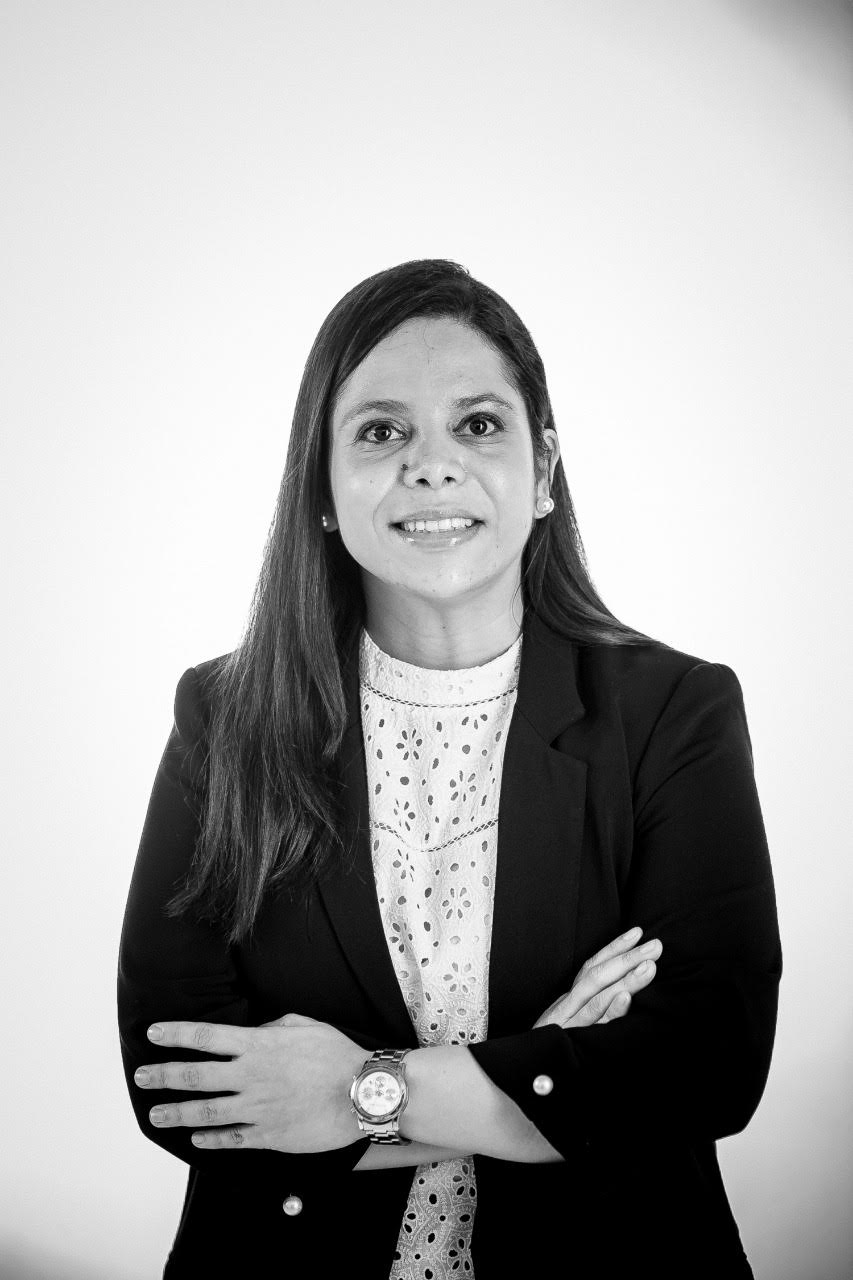 Universidad Pontificia Bolivariana, Medical School, Medellín - Colombia
Universidad Pontificia Bolivariana, Medical School, Medellín - Colombia
How long have you been an ARO member? Since 2019
What do you enjoy most about being an ARO member?
I do really enjoy ARO Meetings and events, it is amazing to share with many researchers from several countries and to know about their research and journeys. To me, it has been great to get involved into the international and membership comittee over the last two years with outstanding professionals.
Where has your favorite MidWinter Meeting (MWM) been?
To me, MidWinter Meeting 2021 was very special. I was transitioning from my postdoc to my current position as an Assistant Professor in my country. Also, that year I received the travel award and in the event dedicated to the award, one of the speakers gave us some kind and amazing words that I won't forget.
Share one memorable experience from a past ARO MWM.
In San José 2020, I presented my first podium at ARO andI was really scared, but when I started talking I felt so comfortable when I saw the people interested in my work. Once I finished it was lovely to see many people coming to ask and share opinions about my work and my labmates there supporting me. I have never seen in my country something like that, that was incredible!
Tell us about your work, with a focus on research efforts.
My research is focused on otopathology of rheumatologic conditions. Over the last four years, we have been studying how Rheumatoid Arthritis, Lupus, Scleroderma and other conditions may affect the middle and inner ear. We have developed some methods to quantify how these conditions affect the articulations, stria vascularis and the otic capsule. Nowdays, we have a better understanding of these conditions and how they can be found in the clinic. To me as an Otolaryngologist, this has given to me a better understanding on how systemic diseases may affect hearing and balance.
Aside from research, what other activities do you participate in?
I'm an active member of the Membership Committee and the International committee at ARO. Besides this, I'm currently working with another latin american ARO member in one educational initiative in Neurotology called La Academia del Vertigo, there we develop some strategies for people in our region to learn about vestibular disorders and how to treat our patients.
George Ordiway
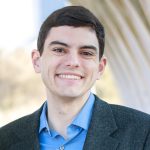
How long have you been an ARO member?
I have been a member since the 2019 Midwinter Meeting.
What do you enjoy most about being an ARO member?
I really enjoy the variety. Seeing all the topics in the ARO abstract book can be a lot, but every field in ARO has fascinating research and welcoming researchers. I've been pleasantly surprised by the talks and posters that have informed my own research.
Where has your favorite MidWinter Meeting (MWM) been?
The 2020 meeting in San Jose, I was able to connect with a lot of different peers and get involved in spARO.
Share one memorable experience from a past ARO MWM.
During the spARO Science Communication Workshop, we did introductions and I mentioned that I play Dungeons and Dragons. Turns out, others did as well, and we actually played a short game during some downtime between sessions.
Tell us about your work, with a focus on research efforts.
My research looks at the development of the central auditory system. Auditory processing is incredibly specialized and precise, with complex microcircuitry and fast kinetics. By looking at the intrinsic neural properties in the brainstem, we can see what ion channels are critical for processes like sound localization and acoustic communication. I also use the auditory brainstem response (ABR) to evaluate hearing maturity in the chicken, which can be compared to other avian and mammalian models.
Aside from research, what other activities do you participate in?
I am a classical/opera singer, and play Dungeons and Dragons. Vastly different hobbies, but I greatly enjoy them both!
Allison Coffin, Ph.D.
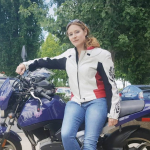 How long have you been an ARO member?
How long have you been an ARO member?
Since 2001 when I was a young PhD student. Not sure I want to admit it's been that long - makes me feel old!
What do you enjoy most about being an ARO member?
The MidWinter meeting! I've made so many great friends in the field and I often see them once a year. I also love learning about the science, of course, but it's really the networking that matters most to me.
Where has your favorite MidWinter Meeting (MWM) been?
Too hard to pick only one! I was one of the few who really liked Daytona Beach, with all of the motorcycles rolling in (I ride). Still, I think San Diego is my favorite location - great spaces for talks, tasty food nearby, and of course, the Top Gun bar across the street.
Share one memorable experience from a past ARO MWM.
Too hard to pick one - here are two. Scientifically, I distinctly remember Peter Narins lecture when he received the Award of Merit. Peter gave an amazing talk with a great mix of science and storytelling, including reminding us why comparative research is so important (ultrasonic hearing in frogs!). Socially, as the owner of the Hair Ball "party hat", I love seeing people break out of their comfort zone and enjoy the dance, or at least agree to dance, even if they don't always enjoy it! Shout out to Matt Kelley the year he was ARO president - he gamely danced for a few minutes before returning to the sidelines.
Tell us about your work, with a focus on research efforts.
My primary research examines the cellular mechanisms of hearing loss and works to develop preventative or restorative therapies. Much of this research focuses on well-characterized damage agents such as aminoglycoside antibiotics and noise, but recently my lab has expanded to determine the ototoxic potential of COVID-19 therapies, with a paper currently in press. Given the vast number of COVID-19 therapeutics under development, it's essential to understand drug toxicity, including ototoxicity, enabling the community to select therapies that maximize antiviral efficacy while minimizing negative side-effects. I'm also interested in how endogenous and exogenous factors influence auditory development and function. Our current NSF-funded work (with Joe Sisneros and Jenny Stone) asks how seasonal fluctuations in estrogen modulate auditory plasticity in the plainfin midshipman fish; a fascinating species that relies on acoustic communication for reproductive success. Another current project asks how hatchery noise impacts lateral line and inner ear development and physiology in Chinook salmon, a species with cultural, ecological, and commercial importance here in the Pacific NW. I'm interested in new collaborations within my areas of interest, specifically projects that take a comparative approach to increase our understanding of fundamental features of the auditory periphery.
Aside from research, what other activities do you participate in?
I'm the co-founder and President of the Association of Science Communicators (formerly Science Talk); the national organization for science communication professionals. The past few years have really showcased the importance of science in society and the need for broader, more inclusive science communication. Within our community, Joe Sisneros and I are the new co-editors for the Springer Handbook of Auditory Research series (affectionately known as the green books). I'm also the Chair of the 2024 Gordon Research Conference on the Auditory System. I'm also a passionate mentor, teacher, reader, and cat lover.
Dennis Barbour, M.D.,Ph.D.
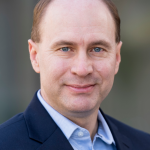 How long have you been an ARO member?
How long have you been an ARO member?
Since 1999.
What do you enjoy most about being an ARO member?
ARO is small enough that basic and applied research can coexist comfortably in society publications and meetings. For those of us interested in the full spectrum of research it makes following work and connecting with others easier.
Where has your favorite MidWinter Meeting (MWM) been?
St. Petersburg, Florida. Can't beat the grouper sandwiches!
Share one memorable experience from a past ARO MWM.
Around 1998 we had such a big rainstorm in St. Petersburg at the midwinter meeting that presenting posters was a challenge. In those days, we printed out 11" x 17" pages and glued them onto mat boards (the rigid cardboard used for mounting photographs in frames.). We then carried these panels to the conference and attached them to the conference posterboard with thumbtacks. The poster hall was on the ground floor of the hotel exposed to the elements (i.e., walls open to the outside). While we were sheltered from the rain, it was so humid that everyone's mat boards curled. You could be listening to a poster presentation and the thumbtacks were popping off left and right. It was dangerous! I vowed never to do that again and only printed single-sheet oversized posters after that, which is now what everyone does.
Tell us about your work, with a focus on research efforts.
I started my career exploring the neurophysiology of auditory cortex in the early marmoset monkey experiments. During that time period I was able to observe and document many new phenomena, indicating how much there was to learn about central auditory coding. More recently my work has shifted to applying principles of probabilistic modeling and machine learning to phenotype human perceptual and cognitive function using primarily behavioral data. This work has led to updated tests of hearing and vision that have several advantages over existing tests. Efforts now focus on more complex cognitive testing procedures and integrating them with perceptual models. Colleagues and I have defined the field of Computational Audiology to encapsulate trends using extensive databases and advanced algorithms to draw more informative conclusions about patients' hearing than has ever been possible before.
Aside from research, what other activities do you participate in?
I am an avid mountain biker and ride in nature just about every week. I also enjoy travel and the outdoors, and greatly appreciate the technology that allows me to work from anywhere these days.
Nina Kraus, Ph.D.
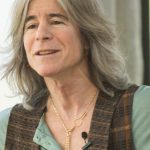 How long have you been an ARO member?
How long have you been an ARO member?
I attended the second meeting at the Happy Dolphin. We were a small crew, with everyone comfortably fitting into a single symposium room. I've been a member in attendance ever since.
What do you enjoy most about being an ARO member?
The science. The colleagues and friendships renewed every year.
Where has your favorite MidWinter Meeting (MWM) been?
St Pete Beach by far.
Share one memorable experience from a past ARO MWM.
Meeting 'Batman,' the blind person who navigates the world through sound. He showed us one can do all kinds of things they are told they will never do. 'Blind people don't ride bikes or climb trees.' Batman does both and teaches other blind people what is possible.
Tell us about your work, with a focus on research efforts.
I make the case for the far-reaching impact of sound, showing how hearing engages how we think, feel, move, and combine our senses. I contribute to the body of knowledge showing how the sounds of our lives engage our biological health for better (musicians, bilinguals) and for worse (concussion, language disorders, autism, HIV, hearing loss). It has impressed me to witness first-hand (in single neurons and humans) how engaging with sound can change the brain. Because hearing, more than any other sense, affects our interactions with others, I place a premium on communicating the scientific rationale for engaging in activities to strengthen the hearing brain and our sonic world. My book OF SOUND MIND How Our Brain Constructs a Meaningful Sonic World communicates this message to any interested reader. It is conversationally written, yet thoroughly referenced, with 80 original illustrations done in partnership with an artist - science is an art. OF SOUND MIND is my love letter to sound, how sound connects us, its biological impact on making us us, and how it affects the world we live in.
Aside from research, what other activities do you participate in?
Making music (guitar, piano, drums, harmonica, singing harmony) mostly with my family, cooking, and being the best nonna I can be to my grandson.
Ivan Lopez, Ph.D.
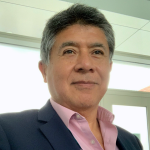 How long have you been an ARO member?
How long have you been an ARO member?
Twenty two years
What do you enjoy most about being an ARO member?
Collegiality, ARO transpires spirit of collaboration and service to the community
Where has your favorite MidWinter Meeting (MWM) been?
Clearwater Beach Florida
Share one memorable experience from a past ARO MWM.
At one ARO meeting my four presentations I submitted were accepted as podium speaker
Tell us about your work, with a focus on research efforts.
My research is focused to understand the molecular pathology of the labyrinthine blood barriers of the human inner ear at the ultrastructural level
Aside from research, what other activities do you participate in?
I am an Argentine tango dancer and a martial artist
Stella Yang, B.S.
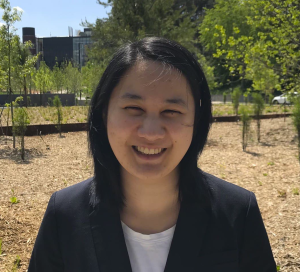 How long have you been an ARO member?
How long have you been an ARO member?
I am a new member, for only a few months since I joined in February 2022 for the Midwinter Conference. Although, in this time, I have joined the JARO Research News committee of spARO.
What do you enjoy most about being an ARO member?
The community of PIs, students, doctors, and everyone involved in research is really refreshing. Not only is everyone willing to contribute what they know and eager to learn from others, but we all seem to be constantly trying to improve the experience and tools for everyone else. Everyone is eagerly problem solving not just in their labs but also for designing conferences and workshops, and it's invigorating to be a part of this group.
Tell us about your work, with a focus on research efforts.
I am an engineer by training and focused on research areas that could utilize these skills: developing surgical imaging devices and simulators for ENT procedures. I have since worked on and learned a lot about fluorescence as a medical tool by developing fluorescent endoscopes and imaging dyes with a focus on otitis media and ear infections. I have built upon already existing and common ENT instruments to enhance their abilities for specific targets utilizing various optical properties. I have also worked to develop a cholesteatoma gerbil model where we studied the diseased tissue's auto fluorescent signature. Using that information, we developed a novel imaging method for assistance in cholesteatoma's surgical removal, with the goal of improving differentiation and reducing recurrence rates. Aside from these projects, I have expanded my knowledge to mouse anatomy (cochlea and middle ear) as well as some drug delivery methods. We are currently working on a project that studies cisplatin's effect on hearing loss since it is a common chemotherapy drug, and how we can topically deliver targeted otoprotective medication to prevent that hearing loss by developing our own liposomes. We are able to penetrate the tympanic membrane without damaging the structure through a thorough understanding of its chemical and physical properties.
Dr. Geoffrey Manley, M.A.,Ph.D.
 How long have you been an ARO member?
How long have you been an ARO member?
I have abstracts that go back to 1988, but I suspect that I was a member well before then. Back then, we didn't keep computer records...
What do you enjoy most about being an ARO member?
Interacting with other members at the meeting and hearing what is going on in the field of auditory research.
Where has your favorite MidWinter Meeting (MWM) been?
I believe the earlier meetings in Florida (Tampa region) were more enjoyable, both from the venue and the smaller size.
Share one memorable experience from a past ARO MWM.
My Award ceremony in 2016. Finally the profound impression that not all I had written had vanished into a vacuum.
Tell us about your work, with a focus on research efforts.
I spent more than 40 years studying the auditory organs of lizards and birds, both their anatomy and physiology. We mostly used classical methods of light, scanning and transmission electron microscopy and single-unit nerve cell recordings from the auditory nerve. Together with some additional work on Caiman and frogs and earlier work on the middle ear of mammals, I gained a deep insight into many aspects of the evolution of vertebrate middle and inner ears and focused much of my later work on further elucidation of that issue. Since about 1990, we carried out a lot of measurements of otoacoustic emissions, especially in lizards, which produces robust emissions in every species so far studied (more than 30). In my retirement I have gained more interest in human ears and continue to cooperate with other labs to learn more about human hearing and its evolution.
Aside from research, what other activities do you participate in?
Traveling, gardening, writing and reading.
Dr. David Moore, Ph.D.
 How long have you been an ARO member?
How long have you been an ARO member?
Since about 1982. So long ago, I can't remember accurately!
What do you enjoy most about being an ARO member?
ARO is the major global professional body for hearing research. I have made many friendships, started collaborations, hired students and staff, and generally kept current about our field through my ARO membership.
Where has your favorite MidWinter Meeting (MWM) been?
There have been too many memorable ones to decide but, in recent years, seeing several of my colleagues and friends receiving the Award of Merit. I also was pleasantly surprised by San Jose as a new location for the meeting.
Share one memorable experience from a past ARO MWM.
Bob Shannon's House Ear Institute parties at the Tradewinds
Tell us about your work, with a focus on research efforts.
I study development and plasticity of the auditory system from a systems, translational and clinical perspective. Recently, our team has demonstrated that children with listening difficulties, but normal audiograms, have essentially normal auditory system function up to the cortex, but a highly speech specific, functional connectivity problem in a broad range of cortical areas. Our other current interest is using smartphone technology to deliver hearing health care in low and middle income countries. In this South Africa based research, we have shown great potential for community health workers to use a smartphone to perform a valid clinical test of hearing and to fit high quality hearing aids to people who typically receive no other hearing health care.
Aside from research, what other activities do you participate in?
Travel, bike riding, hiking and cooking
Dr. Julie Arenberg, Ph.D.
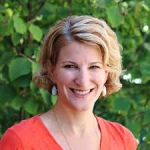 How long have you been an ARO member?
How long have you been an ARO member?
I have been an ARO member since 1996.
What do you enjoy most about being an ARO member?
I enjoy being part of a community of top scientists addressing hearing and balance problems. The midwinter meeting is a highlight, when we can connect, learn from each other, and collaborate.
Where has your favorite MidWinter Meeting (MWM) been?
St. Petersburg Beach and San Diego.
Share one memorable experience from a past ARO MWM.
I really enjoyed the music/symphony outing at one of the San Diego meetings.
Tell us about your work, with a focus on research efforts.
My research is focused on of cochlear implants, devices surgically placed in the inner ears of patients with severe hearing loss.Despite their success, there remains substantial variability in the overall speech perception outcomes for the children and adults who receive them. The main goals of my research are: i) to improve our understanding of how cochlear implants affect the developing auditory system, ii) apply that knowledge to test new methods for programming children and adults, and iii) to study how long it takes listeners to adapt to new cochlear implant programs over the short- and long-term. The results will improve our understanding of how the deafened auditory system develops with cochlear implant stimulation and advance clinical practice to improve hearing outcomes in cochlear implant listeners.
Aside from research, what other activities do you participate in?
I am a co-director of the Audiology division at Mass Eye and Ear and am leading education efforts for future audiologists through a new, collaborative Doctor of Audiology program at the MGH Institute of Health professions in partnership with Mass Eye and Ear. I am also involved in the Speech and Hearing, Biosciences and Technology doctoral program at Harvard.
Dr. Edwin Rubel, Ph.D.
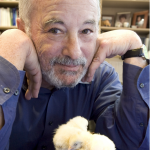 How long have you been an ARO member?
How long have you been an ARO member?
49 years
What do you enjoy most about being an ARO member?
My Colleagues that conduct hearing research
Where has your favorite MidWinter Meeting (MWM) been?
St Petersburg, Florida
Share one memorable experience from a past ARO MWM.
Being aloud to Present the Award of Merit Address to my colleagues
Tell us about your work, with a focus on research efforts.
During my long career I have focused my efforts on the development and plasticity of the inner ear and central auditory pathways.
Aside from research, what other activities do you participate in?
Scuba diving with my ARO colleagues.
Dr. Michael Smotherman, Ph.D.
 How long have you been an ARO member?
How long have you been an ARO member?
28 years
What do you enjoy most about being an ARO member?
Learning about advancements in science of hearing
Where has your favorite MidWinter Meeting (MWM) been?
St. Petersberg Beach FL was always something to look forward to.Hasn't been the same since.
Share one memorable experience from a past ARO MWM.
Watching the first videos of dancing hair cells!
Tell us about your work, with a focus on research efforts.
My lab uses an auditory specialist, echolocating bats, to investigate how local circuits in auditory cortex create tuning for natural sounds.
Aside from research, what other activities do you participate in?
In addition to the neuroscience, we spend a lot of time in the field studying communication behaviors in natural conditions. We also specialize in building Tiki bars, carving Tiki's and making steady improvements in Tiki drinks.
Dr. Sen Chen
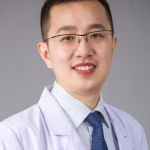 How long have you been an ARO member?
How long have you been an ARO member?
I signed up as a member in 2015
What do you enjoy most about being an ARO member?
Be able to communicate and share the latest research results with fellow researchers
Where has your favorite MidWinter Meeting (MWM) been?
Baltimore
Share one memorable experience from a past ARO MWM.
In 2015, I shared the research progress of our group on GJB2-related deafness at ARO Conference. At the same time, I met many colleagues in hereditary deafness research.
Tell us about your work, with a focus on research efforts.
Our team has been focusing on the phenotype, pathology and deafness mechanism of GJB2-related hereditary deafness, and trying to rescue GJB2-related deafness by drug combined with gene therapy. At the same time, we also explored the relationship between GJB2 gene and its coding products and age-related deafness, hoping to find a new mechanism of age-related deafness.
Aside from research, what other activities do you participate in?
Read novels and travel
Dr. Joost Stultiens, M.D.
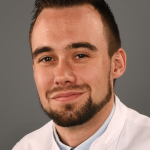 How long have you been an ARO member?
How long have you been an ARO member?
Since the ARO MidWinter Meeting, January 2020
What do you enjoy most about being an ARO member?
The ARO is a rich community that not only concentrates on either clinical work or basic research, but has a focus on both of them and the integration -from bench to bedside- and has attention for kinds of other aspects accompanying the work as an evolving clinician and researcher.
Where has your favorite MidWinter Meeting (MWM) been?
My first MidWinter Meeting in San Jose, CA
Tell us about your work, with a focus on research efforts.
Our current research focuses on the development of an artificial balance organ, the vestibular implant. In 2007, before I started working in Maastricht, the Geneva-Maastricht group were the first to perform a vestibular implantation in a patient with bilateral vestibulopathy. Ten years later, I was hired to aid in the development of a clinically applicable device, with a specific aim on the electrode design and the surgical technique to improve electrode placement and minimize inner ear damage. I combine this PhD work with a residency in Otorhinolaryngology. Additionally, I participate in research in vestibulology and (neuro-)otology. I appreciate sharing our experiences and findings with national or international colleagues as well as, and sometimes even more, with patient groups as (future) benificiaries of our work.
Dr. Esteban Lelo de Larrea-Mancera, Ph.D.
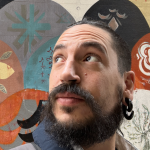 How long have you been an ARO member?
How long have you been an ARO member?
I have been a member twice in the years 2020 and 2022
What do you enjoy most about being an ARO member?
The annual midwinter meeting
Where has your favorite MidWinter Meeting (MWM) been?
San Jose CA
Share one memorable experience from a past ARO MWM.
Unfortunately I have only attended online so far. I received good feedback on my poster although it was scarce.
Tell us about your work, with a focus on research efforts.
I focus on the assessment and possible training of auditory processes, peripheral and central as well as the interface with cognitive and motor processes. I am particularly interested about audiometer interaction in the service of purposeful action. Together with the University of California Brain Game Center, we have developed a portable automatic rapid testing (PART) tool for assessment of sensory (auditory and visual) and cognitive (attention, memory, executive processes) function. Part of the work I am doing now is help in localizing our tools for Spanish-speaking population. Specifically, I collaborate with the Psychiatry (INP) and Neurology (INNN) National Institutes in Mexico City with the aim of implementing and testing our tools in Spanish, and with different clinical populations. Moreover, I have done work with a perceptual learning video-game designed to train on basic auditory function such as spectra-temporal sensitivity and spatial hearing to promote benefits in speech in noise intelligibility. We have had some initial success with young populations without hearing concerns, and now we look to experiment on large samples including older population with and without hearing loss.
Aside from research, what other activities do you participate in?
I like to go on road-trips with my bicycle, I like to explore/play novel indie video-games, I like having wild ideas about research Im never going to conduct but might write down as a series of short stories about the science that could have been...
Dr. Warren Bakay, Ph.D.
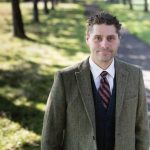 How long have you been an ARO member?
How long have you been an ARO member?
I first joined about a month in to the second year of my PhD at UCL, in January 2013. I've been a student or postdoc member ever since.
What do you enjoy most about being an ARO member?
Meeting people who do what I do and are interested in what I'm interested in. There's nothing more fun than making friends you can nerd out with in the pub.
Where has your favorite MidWinter Meeting (MWM) been?
For my own science, Baltimore, 2015. That was the year where my own research really came together, and I had so much foot traffic at my poster I didn't get to leave it, at all, and the next morning I had people ask me to come show it some more. And San Diego 2016, was when I really got to meet a lot of people in a lot of different labs, and start to build my friends and colleagues. But I've also heard many stories about just how fantastic the St. Pete, Florida, AROs were, sadly a little before my time.
Share one memorable experience from a past ARO MWM.
Baby me, at my first ever ARO, in 2013, defending my first ever poster. Coming from my left, is Ed Rubles, and coming from my right, is Charlie Liberman. They meet each other at my poster, which is on noise induced cochlear synaptopathy and RIFE with references to Charlie's work, and proceed to spend the next 45 minutes talking to me about my work. I surely looked like a deer in the head lights, and it was all I could do not to shake. After Charlie moved along, Ed gave me a hand shake and said I did really well, to calm me down. I pretty much left right afterwards to go to my supervisors' (David McAlpine and Roland Schaette) rental for dinner. When I got there, I must have still been white as a sheet, and this lovely man who I didn't yet know took me in to the kitchen and had me cook with him and talk about music (The Rat Pack, Bobby V, Buble) for the next hour. For those who know him, it could only have been Tino. It really cemented to me why this community can be so amazing.
Tell us about your work, with a focus on research efforts.
IMost of my research has focused on quantifying the precise neuronal mechanisms that are damaged from noise exposure, primarily so called hidden hearing loss levels of noise exposure. My PhD found how auditory neurons in the IC adapt to noisy environments, and how that adaptation is compromised by noise exposure (some of the ability to adapt is destroyed completely!). At the moment, I'm looking at how noise exposure affects neural coding of speech in the IC and Cortex, and I'm doing it in parallel with some human research collaborators, so we can really tie together my animal work with the human work they are doing.
Aside from research, what other activities do you participate in?
There seem to be three things that always seem to come up very quickly when I meet new people: 1) I'm a huge music nerd, and have a lot of opinions on everything from Mozart to The Police to Taylor Swift. 2) I live on a boat, and love to take my boat out for a day sail with friends aboard (obviously with music playing) and 3) My cat looks very adorable in her life jacket.
Dr. Norbert Kopco, Ph.D.
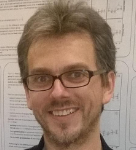 How long have you been an ARO member?
How long have you been an ARO member?
20 years
What do you enjoy most about being an ARO member?
The community, the meeting and the focus on auditory cognitive neuroscience.
Where has your favorite MidWinter Meeting (MWM) been?
Baltimore and St Petersburg, FL
Share one memorable experience from a past ARO MWM.
As a PhD student, meeting for the first time the people who are even now my colleagues and collaborators.
Tell us about your work, with a focus on research efforts.
I'm mostly interested in spatial hearing, both localization and spatial release from masking, and how it is affected by attention and vision. Distance perception and its neural mechanisms, adaptation and learning, as well as crossmodal interactions are all my interest.
Dr. Chenggang Chen, Ph.D.
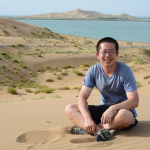 How long have you been an ARO member?
How long have you been an ARO member?
Almost 4 years. I joined ARO after finishing my Ph.D. studies.
What do you enjoy most about being an ARO member?
Attend the MWM and serve on the spARO Steering Committee.
Where has your favorite MidWinter Meeting (MWM) been?
42nd MWM at Baltimore, 2019. This is the first MWM I attended and it is within walking distance.
Share one memorable experience from a past ARO MWM.
My poster is selected for podium presentation in the 45th virtual MWM. I have 12 minutes to present my work, but I finished everything within 9 minutes probably due to nervousness. "What are you planning to do in the remaining 3 minutes?" the modulator asked me. "Q & A," I answered. Surprisingly, I got lots of useful feedback during Q & A.
Tell us about your work, with a focus on research efforts.
I am studying sound localization. Specifically, I am searching for a cortical map of auditory space, modulating spatial processing in the auditory cortex with contextual effects, and training a spiking neural network to localize sound locations. To answer those questions, I use a battery of tools, including wide-field calcium imaging, two-photon calcium imaging, extra- and intra-cellular recording, animal behavior, computational modeling, and machine learning.
Aside from research, what other activities do you participate in?
I am one of the mentorship program coordinators in the spARO Steering Committee where we matched mentees to mentors. I am also an author of Biomedical Odyssey Blog, an award-winning blog owned and managed by Johns Hopkins Medicine.
Dr. William Yost, Ph.D.
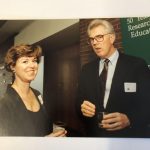 How long have you been an ARO member?
How long have you been an ARO member?
Since 1976
What do you enjoy most about being an ARO member?
The People
Where has your favorite MidWinter Meeting (MWM) been?
Happy Dolphin inn
Share one memorable experience from a past ARO MWM.
Being President
Tell us about your work, with a focus on research efforts.
Sound-source localization
Aside from research, what other activities do you participate in?
Golf, tennis, being with free
Dr. Zippora Brownstein, Ph.D.
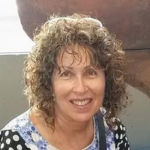 How long have you been an ARO member?
How long have you been an ARO member?
Over 15 years
What do you enjoy most about being an ARO member?
To be part of the top research community of the field and to be updated constantly of the state-of-art studies and activities.
Tell us about your work, with a focus on research efforts.
I am a Research Associate, in the laboratory of Prof. Karen Avraham, at Tel Aviv University, in charge of the human genetics of hearing loss studies. I am working on identifying and characterizing genes involved in deafness in the Jewish population, combining experimental and computational techniques in order to detect all the ‘deafness genes’ in the Jewish population and reach a comprehensive view of the roles these genes play in hearing and deafness.
Dr. Hideko Nakajima, M.D., Ph.D.
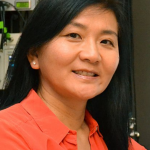 How long have you been an ARO member?
How long have you been an ARO member?
Since about 2000 when I was a graduate student
What do you enjoy most about being an ARO member?
Getting together with colleagues and meeting new members in the field, especially trainees. Learning about new work from posters and having great discussions about them.
Where has your favorite MidWinter Meeting (MWM) been?
St. Petersburg, San Diego, Colorado
Share one memorable experience from a past ARO MWM.
Memorial for David Mountain
Tell us about your work, with a focus on research efforts.
We focus on the acoustics and mechanics of the human ear. Our work involves working with how sound is transmitted from the outer, middle, and inner ear. Projects vary, such as answering basic science questions about form and function of the human cochlear partition. We are developing implantable microphones to enable totally implantable hearing devices such as fully implantable cochlear implant. We're also developing non-invasive diagnostic methods that can automatically diagnose various mechanical pathologies of the ear.
Aside from research, what other activities do you participate in?
Diversity, Equity and Inclusion as the Director of DEI for our graduate program at Harvard Medical School SHBT, and as Vice Chair of DEI for the Dept. of OHNS at Mass Eye and Ear, Boston.
Dr. Haruna Suzuki-Kerr, Ph.D.
 How long have you been an ARO member?
How long have you been an ARO member?
I've been an ARO member for almost 2 years.
What do you enjoy most about being an ARO member?
My research background from Ph.D. was vision science. After a career break, I joined the current hearing research group in 2018 as a research fellow returning to science. As we had been hit by COVID-19 and travel restrictions were imposed, it has been difficult to meet and learn about hearing/balance research happening globally. I joined ARO after learning that ARO2021 was virtual, and it was an opportunity to learn about other research happening in the hearing and balance field. I attended the virtual ARO 2022. Now that some international travels are resuming, I hope to attend the ARO2023 in-person to join the community in person. I also had opportunities to attend some of spARO/ARO Coffee hours, although it's been hard to join due to time differences. It has been nice to be able to meet with people virtually.
Where has your favorite MidWinter Meeting (MWM) been?
Only been to the virtual one last two years, but will look forward to attending future ARO in-person!
Share one memorable experience from a past ARO MWM.
We appreciated being able to join the 2022-2021 ARO virtual from oceania, considering exiting travel restrictions from Covid.
Tell us about your work, with a focus on research efforts.
My research aims to understand the role of the purinergic signaling pathway in the inner ear. The signaling pathway mediated by extracellular ATP plays diverse roles throughout the body. My research has found one of the purinergic receptors to show very high expressions in the inner and outer hair cells of the cochlea. I am currently investigating its function in the context of inner and outer hair cell physiology in the hope this will help us understand inner/outer hair cell homeostasis and how we can protect them from injuries associated with aging/inflammation.
Aside from research, what other activities do you participate in?
In New Zealand, we have an indigenous population of Māori, with Te Reo Māori as the official national language. Providing equitable hearing care for Maori and non-Maori is an extremely important goal for us in New Zealand. As a scientist of the hearing system, I participate in science outreach to raise awareness of the importance of hearing research in the Māori community in the hope of hearing and incorporating their voices in our future research design.
Dr. Jason Tasoulas, Med
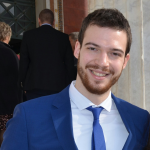 How long have you been an ARO member?
How long have you been an ARO member?
I've been an ARO member for the past 2 years.
What do you enjoy most about being an ARO member?
Being able to interact and collaborate with a diverse group of clinicians and researchers, enrich my knowledge in translational and basic research and learn more about Otology and Auditory Sciences from global leaders in the field.
Where has your favorite MidWinter Meeting (MWM) been?
Unfortunately, I didn't have a chance to attend a MWM yet.
Share one memorable experience from a past ARO MWM.
Unfortunately, I didn't have a chance to attend a MWM yet.
Tell us about your work, with a focus on research efforts.
I'm an MD, DMD working in Otolaryngology/ Head and Neck Surgery research and ultimately I'd love to see myself becoming a Physician-Scientist, after pursuing training in ENT. My previous experiences are mostly in Head and Neck Oncology (Head and Neck Squamous Cell Carcinoma, Salivary gland cancer) but through ARO I had the opportunity to enrich my knowledge and gain a better understanding of hearing & balance. Otology & Hearing research is definitely one of the most exciting fields in Otolaryngology, with numerous impactful contributions in patients' lives, over the past decades. During my clinical rotations at Case Western/UH Hospitals and the UNC I had the chance to see first-hand the dramatic impact of hearing disorders in patients and the treatment options ENTs are now able to offer thanks to decades of research effort in the field. Through my work in ARO's Education and Membership Committees & the spARO Steering Committee I'm trying to contribute towards ARO's mission and serve our research community.
Aside from research, what other activities do you participate in?
I'm an avid runner. I also enjoy American & European Cinema and occasionally cooking (with a particular preference for the Italian/Mediterranean cuisine).
Dr. Lawrence Feth, Ph.D
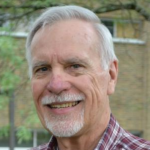 How long have you been an ARO member?
How long have you been an ARO member?
Since the mid-1970s The "Happy Dolphin Days"
What do you enjoy most about being an ARO member?
The wide diversity of research interests that are applied to the study of human hearing and balance.
Where has your favorite MidWinter Meeting (MWM) been?
The Happy Dolphin Inn and the Holiday Inn in Clearwater Beach FL
Share one memorable experience from a past ARO MWM.
I used an early MWM to recruit John Ferraro to join the faculty at the KUMC Hearing and Speech Department. He made to move from Sweedish Hospital in Denver and has been a Jayhawk ever since. I don't think he regrets the move.
Tell us about your work, with a focus on research efforts.
I use behavioral experiments, usuall called psychoacoustics, to study human hearing capabilities in those with normal and those with impaired hearing. Often, the goal is to test a computational model of human auditory provessing, but some projects have a more practical purpose, such as testing the ability of humans to detect alarm sounds. In August 202, thanks partly to the pandemic, I retired from the tenure track and I am now a part-time, temporary professor emeritus.
Aside from research, what other activities do you participate in?
I am a long-time ham radio operator and I serve as the faculty advisor and license trustee for W8LT the amateur radio club at Ohio State.
Dr. Robert Fettiplace, Ph.D
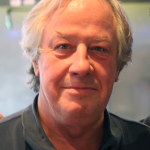 How long have you been an ARO member?
How long have you been an ARO member?
at least 30 years
What do you enjoy most about being an ARO member?
Attending MW meetings, looking at posters and talking with others in my field
Where has your favorite MidWinter Meeting (MWM) been?
First favorite: St Pete's Beach, FL. Second favorite: San Diego CA
Share one memorable experience from a past ARO MWM.
Walking on the beach at Trade Winds, St Pete's Beach and discussing cochlear tuning
Tell us about your work, with a focus on research efforts.
My research concerns investigating the molecular mechanisms of transduction in auditory hair cells, comparing different vertebrate species.
Aside from research, what other activities do you participate in?
Bird watching and photography - excellent in San Diego
Dr. Michael Ebeid, Ph.D.
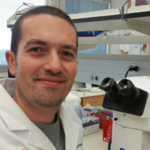 How long have you been an ARO member?
How long have you been an ARO member?
Since 2014
What do you enjoy most about being an ARO member?
Connecting with people in the auditory research field
Where has your favorite MidWinter Meeting (MWM) been?
San Diego, CA
Share one memorable experience from a past ARO MWM.
During my first ARO meeting in 2014, a discussion lead to a strong collaboration and a publication
Tell us about your work, with a focus on research efforts.
My lab is interested in identifying novel genes required for normal development and function of mammalian cochlea. We utilize a variety of mouse genetics, cellular, molecular, imaging and electrophysiological techniques in studying cochlear development and maturation in different genetic mouse models carrying single or multiple gene deletions. Our ultimate goal is to identify novel genes involved in hearing and translate our research into therapeutic techniques to treat hearing loss.
Aside from research, what other activities do you participate in?
Teaching Neurosciences to graduate students
Dr. Lina Reiss Ph.D.
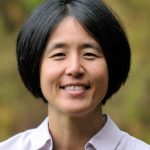 How long have you been an ARO member?
How long have you been an ARO member?
Since 1998 - 24 years.
What do you enjoy most about being an ARO member?
The annual conference, and the inclusive community.The annual conference is always rewarding in the scientific content as well as connections made with colleagues.I also appreciate that ARO leadership is pro-active and at the forefront of promoting equity and inclusion.
Where has your favorite MidWinter Meeting (MWM) been?
St. Pete's Beach was my favorite. I also liked Denver, San Diego, and Baltimore.
Share one memorable experience from a past ARO MWM.
My first ARO as a graduate student, as well as first HI-ARO dinner in 1998. The HI-ARO dinner was with TIlak Ratnanather, Peter Steyger, Rob Raphael, Henry Adler, and his two sign language interpreters, at the Japanese steakhouse at St. Pete's beach. I also remember the ARO poster session which was outdoors-ish in a big tent behind the hotel, and walks along the beach with other students and postdocs from Eric Young's and Brad May's labs.
Tell us about your work, with a focus on research efforts.
I do research in two areas, auditory perception and cochlear implants. I work with both humans and animal models. My current focus in auditory perception is binaural fusion and binaural spectral integration, and how abnormal binaural fusion and integration with hearing loss affects the ability to segregate sounds, especially for speech perception in noise. With cochlear implants, my current focus is on how auditory nerve function changes over time after surgery and with electric stimulation, and how this affects speech perception outcomes.
Aside from research, what other activities do you participate in?
As a member of HI-ARO and BIPOC-CSD, I am involved in advocacy, outreach, and mentoring for those with hearing loss and who are BIPOC.In my free time, I enjoy reading novels, puzzles, swimming, and outdoor activities with my family and two dogs.
Dr. Hongzhe Li, Ph.D.
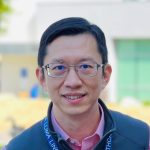 How long have you been an ARO member?
How long have you been an ARO member?
I've been an ARO member since 2001, halfway upon my PhD training in auditory physiology, though later during that decade, I was academically exposed to radiation oncology and molecular immunology, thus briefly away from ARO for 3-4 years.
What do you enjoy most about being an ARO member?
Remain connected to the auditory research enthusiastic cohort, and stay current by getting first-hand understanding of the ongoing research focus in the field.
Where has your favorite MidWinter Meeting (MWM) been?
Probably the 2010 Anaheim meeting, my daughter was born shortly after that meeting.
Share one memorable experience from a past ARO MWM.
Interestingly, the due dates of both my daughters fell into the time frame of ARO MWM meetings, but both of them managed to come outside the time windows, allowing me attending both meetings, with one after the meeting and the other before the meeting.
Tell us about your work, with a focus on research efforts.
My research is primarily focused on inner ear protection, damage and repair, from a variety of ototoxic insults, including but not limited to noise, aminoglycoside antibiotics and antineoplastic cisplatin.Confounding factors such as age, genetic variation, implants, and disease conditions are considered. In particular, I am interested in the intracochlear trafficking routes/mechanisms of ototoxicants under normal and pathological conditions.
Aside from research, what other activities do you participate in?
Probably long-distance running, these days.
Dr. Jagmeet Kanwal, Ph.D.
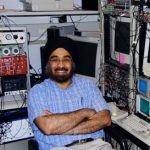 How long have you been an ARO member?
How long have you been an ARO member?
On and off for over 30 years.
Where has your favorite MidWinter Meeting (MWM) been?
Saint Petersburg Beach, Florida.
Share one memorable experience from a past ARO MWM.
Eating smoked salmon for lunch followed by sushi for dinner with colleagues and famous scientists.
Tell us about your work, with a focus on research efforts.
My research has focused on understanding the neural mechanisms for encoding and decoding of social communication sounds in bats. This involves neural recordings from the auditory and frontal cortex and the amygdala. My current work is focused on understanding attentional mechanisms using zebrafish as model organisms.
Aside from research, what other activities do you participate in?
Grant proposal and manuscript reviews. I have served on the ARO diversity committee and also teach about the auditory system to graduate and medical students.
Dr. Christopher Plack, Prof.
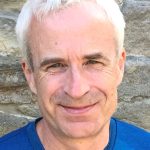 How long have you been an ARO member?
How long have you been an ARO member?
I honestly can't remember! 25 years?
What do you enjoy most about being an ARO member?
Discussing science at the MWM
Where has your favorite MidWinter Meeting (MWM) been?
St. Pete's Beach
Tell us about your work, with a focus on research efforts.
I research the physiological bases of normal and impaired human hearing. My current interests include the effects of noise exposure, age, diabetes, and dementia on hearing, with a focus on sub-clinical deficits that are not revealed by conventional audiometry.
Aside from research, what other activities do you participate in?
I teach at undergraduate and post-graduate level. In my private life, I play acoustic and electric guitar, and enjoy walking and climbing.
Dr. Geoffrey Manley, M.A., Ph.D.
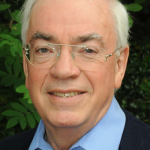 How long have you been an ARO member?
How long have you been an ARO member?
Not sure, but the oldest abstract I still have is from 1987...
What do you enjoy most about being an ARO member?
Single meeting bringing virtually all colleagues together.
Where has your favorite MidWinter Meeting (MWM) been?
St. Petersburg Beach.
Share one memorable experience from a past ARO MWM.
My acceptance of the 2016 ARO award.
Tell us about your work, with a focus on research efforts.
I no longer have my own lab, so I cooperate with others to continue my work on otoacoustic emissions. That currently mostly involves the study of unusual mammals, including humans. I still maintain an interest in non-mammals, however, and have recently published further work, particularly on lizard emissions, e.g., a review of otoacoustic emissions in non-mammals (doi:10.3390/audiolres12030027).
Aside from research, what other activities do you participate in?
Events at the University of Oldenburg, including of the consortium "Hearing for All".
Dr. Joel Snyder, Ph.D.
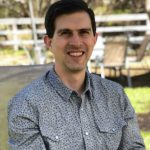 How long have you been an ARO member?
How long have you been an ARO member?
I've been a member for probably about 15 years, since I was a post-doc. I joined when I was getting into auditory scene analysis research because somehow I found out about all the great researchers in that area who were attending ARO.
What do you enjoy most about being an ARO member?
The conferences are amazing, especially the poster sessions. It's remarkable how a lot of members really engage you at your poster, and I before ARO I really didn't get that experience at other conferences.
Where has your favorite MidWinter Meeting (MWM) been?
I really liked ARO in Baltimore, mostly because of the amazing seafood and the Belgian beer bar near the conference venue.
Tell us about your work, with a focus on research efforts.
My lab uses behavioral and event-related brain potential (ERP) measures of auditory perception and cognition, with special interests in auditory scene perception and music perception. Projects that recently wrapped up were on identifying neural mechanisms of bistable auditory perception and understanding the development and neural correlates of musical beat perception. Right now I’m focused on several things: 1) mentoring NDSEG fellow Maggie McMullin who’s creating and acoustically analyzing natural auditory scene recordings and beginning to do behavioral and ERP experiments with the scenes to understand how we perceive objects in their natural settings and more global aspects of our acoustic surroundings, 2) working with Colleen Parks at UNLV using computational and ERP measures to understand why visual long-term memory is so much better than auditory long-term memory, 3) working with my colleagues Erin Hannon, Stephen Benning, and Solena Mednicoff on a foundation-funded project at UNLV to study how misophonia develops and how it’s related to other auditory emotional experiences like ASMR and musical chills. I’m also working with colleagues at UNLV on a non-auditory study funded by the Defense Department to use visual ERPs and eye-tracking to understand how amputees process videos of other amputees performing movements that they are trying to learn to make with their new prosthetic limbs. As you can see, I’m very fortunate to have amazing colleagues and trainees at UNLV, and it is a complete thrill to get to help so many different kinds of research projects get done. Now that I’ve been around a few years, I’m also amazed at the accomplishments of former trainees who have moved on to new post-doctoral and faculty positions positions. I can’t help but shout out a few them, like Melissa Gregg, Christina Vanden Bosch der Nederlanden, Nathan Higgins, and Brian Metzger who are now Assistant Professors, and Karli Nave and Samantha O’Connell who are now post-doctoral fellows. I’ve also been amazed with other former trainees like David Little, Vanessa Irsik, and Jessica Nave-Blodgett, who have seamlessly moved into the private sector, a move that would frankly scare the heck out of me if I were to try it. I don’t know what else I’ll get into in the future, but I’m pretty sure it will be a lot of fun discovering new things and helping younger scientists accomplish their career goals!
Aside from research, what other activities do you participate in?
I bake sourdough pretty much every weekend, and have been doing that for about 7 years. I also play basketball, and started lifting weights a few years ago. I live a pretty simple life, and highly encourage people to find joys outside of science to stay balanced and busy (but not too busy).
Dr. Elizabeth Olson, Ph.D. -- 2022 ARO President
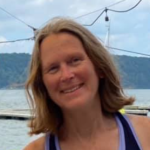 How long have you been an ARO member?
How long have you been an ARO member?
I joined in about 1988, so about 34 years.
What do you enjoy most about being an ARO member?
The ARO conference and the terrific involvement of the ARO members in ARO. I also like how international the membership is, and the combination of clinical and basic science that is presented at the meeting.
Where has your favorite MidWinter Meeting (MWM) been?
Tradewinds! But I also did liked Baltimore because the travel was easy for me. And San Diego was a great spot. Looking forward to getting back to Florida this year -- I love hitting the Florida warmth in February, coming from the northeast.
Share one memorable experience from a past ARO MWM.
Going swimming in the rather chilly Atlantic with Heidi Nakajima and Mike Ravicz. On the research side, I remember years ago coming down to my poster one morning and seeing that there was a chair set up so someone could sit and read the poster, I guess from the previous evening. That was a very gratifying moment. The posters at ARO have always been a feature of the meeting.
Tell us about your work, with a focus on research efforts.
I work mainly on understanding how the cochlear amplifier functions as a whole. We know (or think we know) the pieces that go into producing the enhanced motion and tuning in the healthy cochlea. However, how these pieces fit together to do the job is still a puzzle. Now we have new tools to observe many more of the intra-organ motions than just a few years ago and that is exciting but with new observations come new puzzles. It is exciting. I'm also working on a totally implantable microphone with super smart and productive students and collaborators from MIT and MEEI, who are really moving that project forward. In my lab we are currently working on how to adapt the microphone for a large animal trial.
Aside from research, what other activities do you participate in?
I garden at my apartment building, which has extensive green space. I volunteer tutor in middle school math. I serve as a Hearing Research section editor, and currently am president of ARO. I like to bike around NYC with a friend, and walk my dog, go to museums and parks. I pastel paint, mainly when I'm on vacation in Maine. My three sons are adults but they still come to Maine for a week in August.
